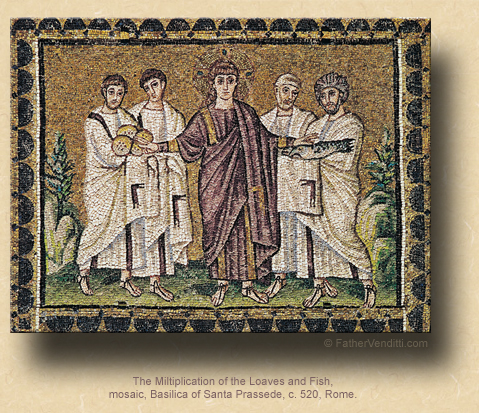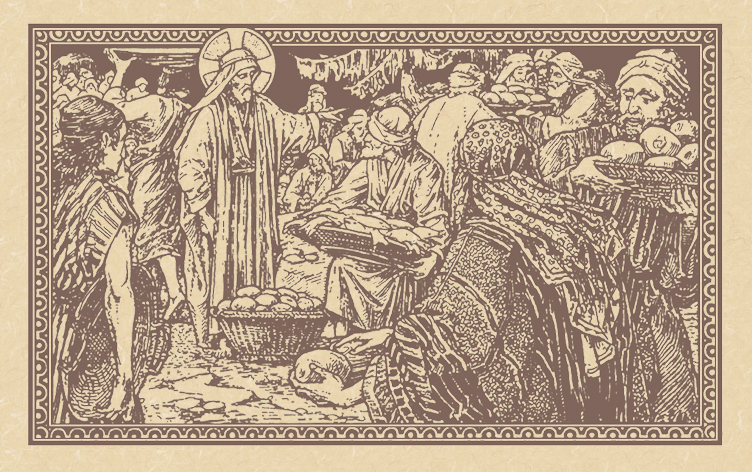Did You Take Your Medication Today?
The Second Friday of Easter; the Memorial of Saint Peter Chanel, Priest & Martyr; or, the Memorial of Saint Louis Grignion de Montfort, Priest.*
Lessons from the feria, according to the ordinary form of the Roman Rite:
• Acts 5: 34-42.
• Psalm 27: 1, 4, 13-14.
• John 6: 1-15.
|
When the memorial of St. Peter is observed, lessons from the feria as above, or from the proper:
• I Corinthians 1: 18-25.
• Psalm 117: 1-2.
• Mark 1: 14-20.
…or, any lessons from the common of Martyrs for One Martyr during Easter, or the common of Pastors for Missionaries.
|
|
When the memorial of St. Louis is observed, lessons from the feria as above, or from the proper:
• I Corinthians 1: 18-25.
• Psalm 40: 2, 4, 7-10.
• Matthew 28: 16-20.
…or, any lessons from the common of Pastors for One Pastor.
|
The Third Class Feast of Saint Paul of the Cross, Confessor.**
Lessons from the proper, according to the extraordinary form of the Roman Rite:
• I Corinthians 1: 17-25.
• [The Gradual is omitted.]
• Luke 10: 1-9.
Thomas Friday; the Feast of the Holy Apostles Jason & Sosipater; the Feast of the Holy Martyrs Dadas, Maximus & Quintillianus; and, the Feast of Our Holy Father Cyril, Bishop of Turov.***
Lessons from the pentecostarion, according to the Ruthenian recension of the Byzantine Rite:***
• Acts 5: 1-11.
• John 5: 30—6: 2.
FatherVenditti.com
|
 7:19 AM 4/28/2017 — We've looked at our Lord's feeding of the five thousand before, and seen in it a prefiguring of the Blessed Eucharist;—and, were we not in the midst of the Easter season, with the Paschal mystery behind us, we would do so again—but, today I would like to train our spiritual microscope on only one small thing said by our Lord on this occasion. 7:19 AM 4/28/2017 — We've looked at our Lord's feeding of the five thousand before, and seen in it a prefiguring of the Blessed Eucharist;—and, were we not in the midst of the Easter season, with the Paschal mystery behind us, we would do so again—but, today I would like to train our spiritual microscope on only one small thing said by our Lord on this occasion.
In the narrative leading up to the miracle, the Blessed Apostle John makes specific mention of the fact that Jesus “himself knew what he was going to do” (John 6: 6 NABRE), and yet He still asks the question: “Where can we buy enough food for them to eat?” (v. 5). John says He does this to test them. Test them regarding what?
Sometimes Jesus makes us, too, see that our problems are too great for us to handle alone, that there's little or nothing we can do of our own accord about whatever situation confronts us. He asks us not to pay too much attention to pragmatic concerns because there's not much we can do about them anyway, and dwelling on them only causes us to become pessimistic; that we need, instead, to rely on supernatural means, to rely more on Him than on our own efforts.
But, there is a danger in this: the danger of spiritual passivity. Our Lord wants us to avoid thinking that the solution lies in human effort alone, but at the same time He is not inviting us to become Quietists. The Quietists were a group of heretics in the early middle ages who felt themselves so overwhelmed by their spiritual struggles and their enslavement to sin that they developed this approach to God's grace that caused them to regard any human effort as evil; they believed that there was nothing we could do in the face of sin and temptation, so all we can do is dump it all in God's hands and do nothing, since all human effort in the face of sin is futile. What the Quietists thought was total abandonment to the will of God was really nothing more than spiritual laziness disguised as the virtue of Hope.
This particular spiritual defect you see a lot among some hyper-spiritual Catholics who struggle with a lot of medical issues, and it's an example close to my heart because, as you know, I've had my own share of medical difficulties over the years for which I've endured surgeries and medicines and what have you. I had a parishioner once who had been diagnosed with a psychiatric problem for which she had been prescribed medication, and as long as she took the medicine, she was fine; but, the notion that she needed medicine to be normal bristled against her personal spirituality. She felt that it was somehow unholy to rely on doctors and medicines, and latched herself onto all sorts of what they call holistic treatments that don't really do anything, coupled with constant novenas and prayers and otherwise good spiritual practices, but which are not substitutes for medical science, and it became a vicious cycle: she would take the medicine for a time, then start to feel better, then stop taking the medicine and start making novenas, and before too long she was all whacked out again.
Now, when we looked at this miracle before as a prefiguring of the Eucharist, we reflected on the fact that our Lord doesn't do the miracle straight without any material means at all. He takes what is available, in this case, five barely loaves and two fish; and, the lesson we drew from that was that God, in His divine care over us, requires us to contribute something to the effort as a condition to dispensing His grace. In confession, for example, He forgives our sins, but He requires us to speak the sins first, express true sorrow for them, and make a purpose of amendment.  In the Blessed Eucharist, we have to provide the bread and wine, and He leaves the Sacrament in the form of bread and wine so that we need to make use of our own faith to see in that sacrament our Blessed Lord. But this manner our Lord has of imparting His grace—requiring us to provide something of the miracle ourselves—is not restricted to the sacraments: in every dispensation of grace, there is always something that we must provide by means of our own effort. In the case of today's Gospel lesson, Jesus makes use of what's already there, a few loaves and a few fish, and He supplies the rest; but, as meager as the material on hand was, He still refused to do it all Himself. In the Blessed Eucharist, we have to provide the bread and wine, and He leaves the Sacrament in the form of bread and wine so that we need to make use of our own faith to see in that sacrament our Blessed Lord. But this manner our Lord has of imparting His grace—requiring us to provide something of the miracle ourselves—is not restricted to the sacraments: in every dispensation of grace, there is always something that we must provide by means of our own effort. In the case of today's Gospel lesson, Jesus makes use of what's already there, a few loaves and a few fish, and He supplies the rest; but, as meager as the material on hand was, He still refused to do it all Himself.
This is how our Lord acts in our lives. Abandonment to the will of God is not a call to Quietism or spiritual passivity. When we look at our lives and see changes that must be made and things that must be done, our Lord wants us to be proactive. We know we can't do it all alone, which is why He offers us His grace, and we already know what disasters can unfold when we try to do everything ourselves without relying on God's grace; but, equally as disastrous is when we go to the opposite extreme and just sit back in our spiritual recliners and wait for our Lord to fix everything. Saint Augustine used the example of the farmer: God supplies the miracle of life, He makes the rain to fall, He makes the sun to shine; but, nothing's going to grow if the farmer doesn't plow the field and sow the seeds. Nor is anything going to grow if he plants at the wrong time, or plants the wrong type of seed for the climate in which he lives. All of this the farmer must figure out and do for himself. That doesn't make the miracle of life any less miraculous, nor does it make the farmer any less reliant on God (cf. Commentary on Psalm 125: 5, PL 36, 164).
Every day, when we offer Holy Mass, the priest prays over the bread and wine to be transformed using words taken directly from the synagogue service of our Lord's time: Benedíctus es, Dómine, Deus universi … fructum vitis et óperis mánuum hóminum…. The bread we offer is both the “fruit of the earth and work of human hands”; not just one or the other, but both. And when we receive the Blessed Eucharist in Holy Communion, the grace of our Lord's Blessed Sacrament enters our souls, but will do nothing for us unless we, ourselves, put that grace into action.

* A Marist Father from France, Peter Chanel (1803-1841) labored on the island of Futuna. He was murdered when the chief's son requested baptism because of his preaching. He is regarded as the Apostle of Oceania.
A secular priest of the Diocese of Paris, Louis de Montfort (1673-1716) was born in Brittany and ordained at twenty-seven. He was the first to devise the current method of reciting the Holy Rosary, founded an order of priests called the Company of Mary, and a community of women called the Daughters of Divine Wisdom devoted to the poor.
** Paul of the Cross († 1775) was the founder of the Passionist Fathers.
*** Jason and Sosipater are believed to have been among the seventy-two sent out to preach by our Lord in Luke 10, and that they were cousins of the Apostle Paul.
Maximus, a Reader and interpreter of the Scriptures, with his disciples, Quinctillianus and Dadas, was arrested, condemned and beheaded at Dorostorum in Lower Mysia (now Sillistria in Bulgaria) about A.D. 303. They were therefore among the countless victims of the great persecution under Diocletian, the tragic prelude to the Peace of the Church established by Constantine.
Cyril of Turov (1130–1182) was one of the first and finest theologians of Kievan Rus', and served as Bishop of Turov in present day Belarus. His feast was added to the Roman calendar by Pope Blessed Paul VI in 1969.
|

